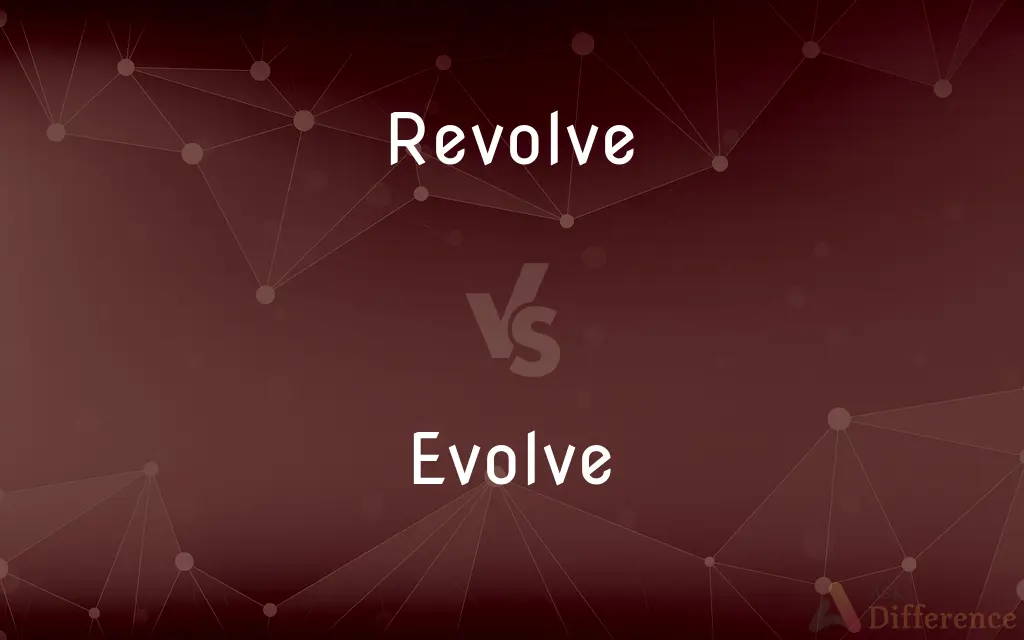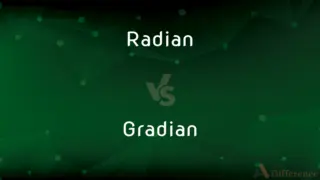Revolve vs. Evolve — What's the Difference?
By Tayyaba Rehman — Updated on October 12, 2023
Revolve means to turn around a central point. Evolve means to develop gradually. While "revolve" implies rotation, "evolve" indicates progression or change.

Difference Between Revolve and Evolve
Table of Contents
ADVERTISEMENT
Key Differences
Revolve primarily indicates a movement where something turns around a central point or axis. This motion can be either in a circular or orbital manner. Evolve, on the other hand, denotes a process of gradual change or development, often over long periods.
The term revolve can be associated with physical movements, like how the Earth revolves around the Sun. It can be used to describe the rotational movement of various objects or entities. In contrast, evolve often describes changes in biological, cultural, or conceptual aspects. For instance, species evolve over time due to natural selection.
When you think of revolve, consider the repetitive motion involved, like the blades of a fan revolving. There's a consistent and predictable pattern to it. Whereas with evolve, the emphasis is on transformation and progression, like how technologies evolve to become more advanced and efficient.
In the context of discussions or thoughts, to revolve around something means to focus or center on a particular topic or theme. Meanwhile, when ideas or theories evolve, they undergo refinement, expansion, or shifts in understanding.
Lastly, revolve has a sense of returning to the same position after a full rotation, like hands on a clock. Evolve, however, underscores a one-way progression, often towards improvement or adaptation, like how businesses evolve to meet changing market demands.
ADVERTISEMENT
Comparison Chart
Primary Definition
Turn around a central point or axis
Develop or change gradually
Associated Movement
Rotational or orbital
Progressional or transformational
Contextual Usage
Physical movement or focus of attention
Biological, cultural, or conceptual change
Predictability
Repetitive and consistent
Indicates change and progression
Directionality
Returns to starting point after full turn
One-way progression or development
Compare with Definitions
Revolve
To turn around on an axis or center.
The Earth revolves around the Sun.
Evolve
To develop gradually from a simple to a more complex form.
Over millions of years, dinosaurs evolved into birds.
Revolve
To focus attention or be centered.
Their discussions revolve around the upcoming event.
Evolve
To undergo gradual change.
Music genres evolve over time to reflect societal changes.
Revolve
To return to the same position after turning.
The wheel revolved and returned to its starting point.
Evolve
To derive or come into being through evolution.
This species evolved in response to its changing environment.
Revolve
To orbit a central point
The planets revolve around the sun.
Evolve
To work out or develop.
We need to evolve a solution to this problem.
Revolve
To turn on an axis; rotate.
Evolve
To achieve or produce through evolution.
The team evolved a new strategy for marketing.
Revolve
To be arranged as revolving credit
His credit line revolves.
Evolve
To develop or achieve gradually
Evolve a style of one's own.
Revolve
To be centered
Their troubles revolve around money management.
Evolve
To work (something) out; devise
"the schemes he evolved to line his purse" (S.J. Perelman).
Revolve
To cause to revolve.
Evolve
(Biology) To develop (a characteristic) by evolutionary processes.
Revolve
To ponder or reflect on
Revolved the matter in his mind.
Evolve
To give off; emit.
Revolve
To bring back into a particular place or condition; to restore.
Evolve
To undergo gradual change; develop
An amateur acting group that evolved into a theatrical company.
Revolve
(transitive) To cause (something) to turn around a central point.
Evolve
(Biology) To arise or transform through evolutionary processes.
Revolve
(intransitive) To orbit a central point (especially of a celestial body).
The Earth revolves around the sun.
Evolve
To move in regular procession through a system.
Revolve
(intransitive) To rotate around an axis.
The Earth revolves once every twenty-four hours.
Evolve
(intransitive) To change; transform.
What began as a few lines of code has now evolved into a million-line behemoth.
Revolve
(intransitive) To move in order or sequence.
The program revolves through all the queues before returning to the start.
Evolve
To come into being; develop.
Revolve
To ponder on; to reflect repeatedly upon; to consider all aspects of.
Evolve
(biology) Of a population, to change genetic composition over successive generations through the process of evolution.
A hundred thousand years from now, will Homo sapiens have evolved into beings unrecognisable to their ancestors?
Revolve
To read through, to study (a book, author etc.).
Evolve
(intransitive) Of a trait, to develop within a population via biological evolution.
How long ago did beaks evolve?
Revolve
(theater) The rotation of part of the scenery within a theatrical production.
Evolve
(transitive) Of a population, to acquire or develop (a trait) in the process of biological evolution.
How long ago did birds evolve beaks?
Revolve
(theater) The rotating section itself.
Evolve
(chemistry) To give off (gas, such as oxygen or carbon dioxide during a reaction).
To evolve odours
Revolve
(obsolete) A radical change; revolution.
Evolve
(transitive) To cause something to change or transform.
Revolve
To turn or roll round on, or as on, an axis, like a wheel; to rotate, - which is the more specific word in this sense.
If the earth revolve thus, each house near the equator must move a thousand miles an hour.
Evolve
To unfold or unroll; to open and expand; to disentangle and exhibit clearly and satisfactorily; to develop; to derive; to educe.
The animal soul sooner evolves itself to its full orb and extent than the human soul.
The principles which art involves, science alone evolves.
Not by any power evolved from man's own resources, but by a power which descended from above.
Revolve
To move in a curved path round a center; as, the planets revolve round the sun.
Evolve
To throw out; to emit; as, to evolve odors.
Revolve
To pass in cycles; as, the centuries revolve.
Evolve
To become open, disclosed, or developed; to pass through a process of evolution.
Revolve
To return; to pass.
Evolve
Work out;
We have developed a new theory of evolution
Revolve
To cause to turn, as on an axis.
Then in the east her turn she shines,Revolved on heaven's great axile.
Evolve
Undergo development or evolution;
Modern man evolved a long time ago
Revolve
Hence, to turn over and over in the mind; to reflect repeatedly upon; to consider all aspects of.
This having heard, straight I again revolvedThe law and prophets.
Evolve
Gain through experience;
I acquired a strong aversion to television
Children must develop a sense of right and wrong
Dave developed leadership qualities in his new position
Develop a passion for painting
Revolve
Turn on or around an axis or a center;
The Earth revolves around the Sun
The lamb roast rotates on a spit over the fire
Revolve
Move in an orbit;
The moon orbits around the Earth
The planets are orbiting the sun
Electrons orbit the nucleus
Revolve
Cause to move by turning over or in a circular manner of as if on an axis;
She rolled the ball
They rolled their eyes at his words
Revolve
To move in a circular or curving path.
The dancers revolve gracefully on the stage.
Revolve
To orbit another object.
The moon revolves around our planet.
Common Curiosities
Can revolve be used figuratively?
Yes, for example, when thoughts revolve around a topic, it means they focus on it.
What's the main concept behind evolve?
Evolve primarily denotes gradual development or change over time.
Can ideas evolve?
Yes, ideas can evolve, meaning they can change, expand, or improve over time.
Does revolve always imply a complete rotation?
No, but it often implies the potential for a full rotation around an axis or point.
How is evolution related to evolve?
Evolution is the process or result of evolving, especially in biology referring to species' development over generations.
What causes things to revolve?
Physical forces, like gravity, can cause objects to revolve around others.
Is human evolution an example of evolve?
Yes, human evolution is a classic example of species adapting and changing over time.
What does revolve mean in astronomy?
In astronomy, revolve refers to an object orbiting another, like planets around the Sun.
Is revolving the same as rotating?
While both imply turning, revolving often suggests movement around another object, while rotating emphasizes turning on an axis.
Can businesses evolve?
Yes, businesses can evolve by adapting to market changes or innovating.
Does revolve have a fixed path?
Typically, yes. Objects revolve in predictable paths like orbits or circles.
Does evolve always imply improvement?
Not always; it denotes change, which might be neutral or even negative in some contexts.
Can an object revolve around multiple points?
While uncommon, it's possible, especially in complex systems or mechanisms.
If something revolves quickly, does it evolve faster?
Not necessarily. Revolve relates to movement, while evolve relates to change. They're different concepts.
Are revolving doors named because they revolve?
Yes, revolving doors turn around a central axis, hence the name.
Share Your Discovery

Previous Comparison
Adulteration vs. Substitution
Next Comparison
Radian vs. GradianAuthor Spotlight
Written by
Tayyaba RehmanTayyaba Rehman is a distinguished writer, currently serving as a primary contributor to askdifference.com. As a researcher in semantics and etymology, Tayyaba's passion for the complexity of languages and their distinctions has found a perfect home on the platform. Tayyaba delves into the intricacies of language, distinguishing between commonly confused words and phrases, thereby providing clarity for readers worldwide.















































